|
Prelude
Day 1: Arrival in Lhasa
Day 2: Sera Monastery
Day 3: Bumpari Mountain
Day 4: Urban Kora
Day 5: Drepung Monastery
Day 6: Potala Palace Kora
Day 7: Gyaphelri Mountain
Day 8: Preparations for Kailas
Day 9: Gyantse
Day 10: Tashilungpo Monastery
Day 11: Lhatse
Day 12: Saga
Day 13: Pariyang
Day 14: Darchen
Day 15: Dirapuk Monastery
Day 16: The Glacier
Day 17: Dzutrulpuk Monastery
Day 18: Lake Mansarovar
Day 19: Return to Saga
Day 20: Nyalam
Day 21: Return to Lhatse
Day 22: Lhasa 2.0
Coda
|
Day 14: Darchen
After breakfast all 6 of us pile into the Landcruiser with all our baggage and head off for Darchen, the base camp for Mount Kailas. Fitting all of us into the truck is very tight but manageable - our guide in the trunk with the baggage is the one who has really drawn the short straw. Just outside of Pariyang we pass some kind of religious center that apparently offers accommodation. If I ever go again I will take them up on it even if I have to convert to their religion (so long as it doesn't actually involve human sacrifice.)
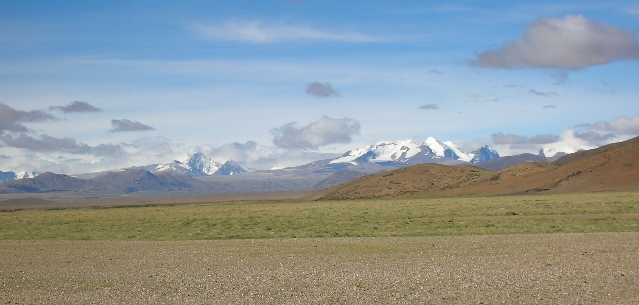 | The Road Out of Pariyang |
The scenery is even more beautiful than before: the work on the road continues undiminished. Ironic that an ancient Hindu legend is mainly responsible for this very modern Chinese road-building operation.
 | The Swiss Couple Being Unbearably Cute |
The luvy-duviness of the Swiss couple was cute in the beginning but has been starting to wear on me, and our new close quarters (I am stuck in the back seat with them full time) are aggravating my mood somewhat. The Tibetans sense the change in mood, and in the beginning are supportive when we start a group sing-along.
However as the mood becomes sillier and sillier
('The fascinating witches
who put the scintillating stitches
in the britches
of the boys who put the powder on the noses
of the faces of the ladies
of the harem of the court of King Caractacus
were just passing by...')
they become disapproving. We continue long enough to make our point that this is our pilgrimage and we have a right to be silly if we want.
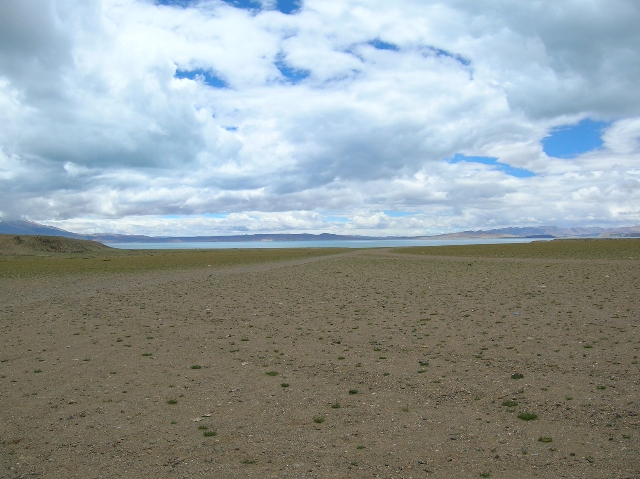 | First View of Lake Mansarovar |
Around 3 in the afternoon we reach the sacred spot where Lake Mansarovar (and on clear days Mount Kailas) first become visible. We circle the cairn twice and hear a 'Thwap!' from under the hood. Like Simeon who clung to life until he had seen the living Jesus then said 'Lord, now let thy servant depart in peace', our alternator belt obviously decided to hold itself together until it reached this holy place. We have a problem: our battery will no longer charge, and we don't know how long it can spark the engine before it gives out. When this happened to me in the States, the battery lasted 40 minutes, which would not be enough to get us anywhere. We think vaguely of ways to improvise a belt, but tolerances are a lot tighter since the days when you could use nylons (plus none of us has any anyway.)
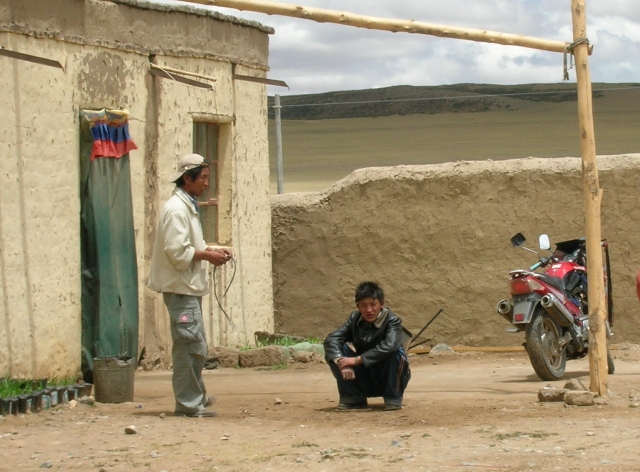 | Dorje at Hor Chu Holding our Alternator Belt |
We coast down to Hor Chu, a settlement if anything more appalling than Pariyang. Normally it has a small auto repair place, but the brothers who run it are on a two-day trip to get a spare part. We persuade one of the locals to let us into the shop without the owners' knowledge (!) hoping to see an alternator belt for a Landcruiser (which is after all the most common vehicle here), but no luck. So there's nothing left for it but to forge on to Darchen and hope for the best.
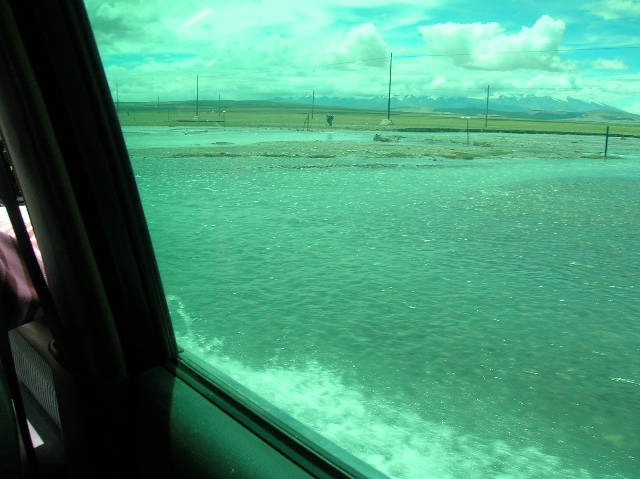 | Fording a Stream near Darchen |
Somewhat to all our surprise we make it to Darchen OK, fording several streams to do so. Our driver now has several days to make the necessary repairs.
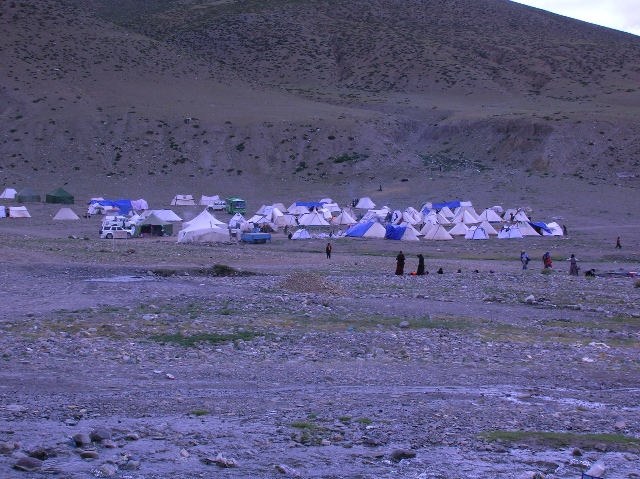 | Camping Area on Outskirts of Darchen |
So much has been written about how horrible Darchen is that we are surprised to find out that, by our present lowered standards, it's actually not so bad. OK, it's dirty, untidy, the toilet is a stinking hole in the ground, and it's a bureaucratic nightmare, but it's in a beautiful spot, a lovely mountain stream runs through it, the people are actually pretty nice, and we manage to get the last room in the Mansarovar Hotel. The room is a converted corridor and there is another room beyond ours, and the only way those folks can get in or out is through our room.
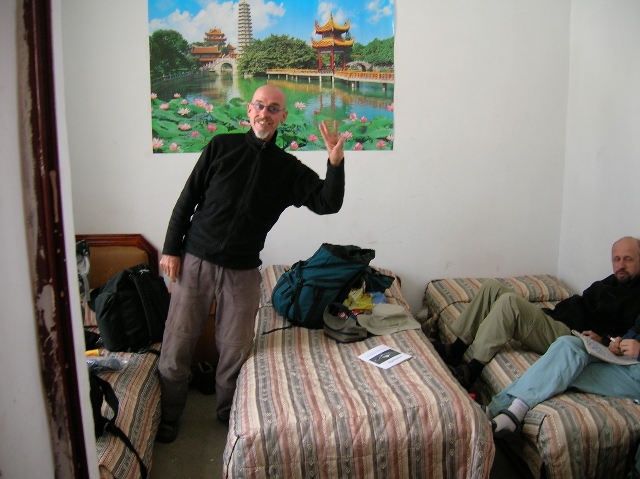 | Our Hotel Room in Darchen |
I read in 'Circling the Sacred Mountain' (that's right, the book I threw at the kid) that the first time you circle the mountain is to clean up the bad karma from your past, the second time is to develop good karma for your future, and the third time is to develop the ability to help others. I was talking in Chengdu to a young Australian who made it twice around in four days, and I am determined to do the same thing. My first plan is to set off immediately, use the two hours of daylight remaining, and rendezvous with the rest of my party at lunchtime three and a half days from now. However, Dorje has to take my passport to register with the authorities and can only give it back after 8 p.m. so I make another plan: I will set off at 4 a.m. and see if I can get over the Drolma La pass tomorrow. The rest of my party are a little surprised that I don't want to go with them, and Dorje is of course concerned that I am safe, but on the whole they're very supportive.
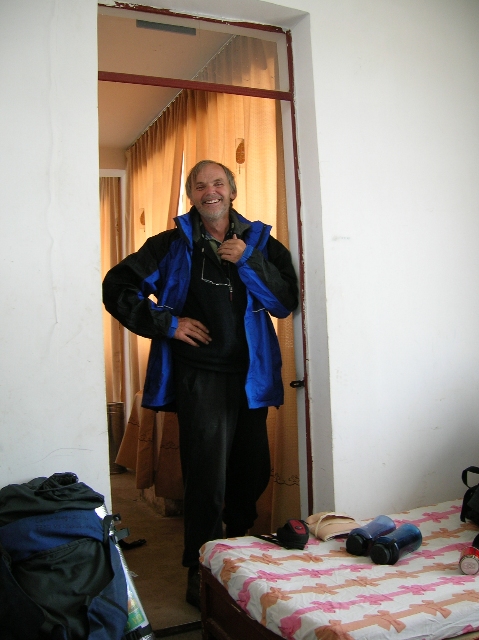
Me in Doorway of Darchen Hotel Room |
Since I will be starting off in total darkness, I try to scope out the beginning of the kora while it's still daylight. I have a lot of trouble finding it. Oddly, this most famous pilgrimage has neither a definite start nor a definite end. I walk up the left side of the stream and head out of town the left. There are several thin paths below a low ridge that could be the start of the kora or could just be animal trails, nothing definite. I head back and join the others for dinner, which is the best meal we are to have in the whole of Western Tibet (admittedly the competition for this title is not exactly fierce.) The owners, brothers from Lhasa, are ethnically Tibetan but prefer to speak Chinese even among themselves. They have some English and some understanding of what Western tourists want, which we, big babies that we are, have really been missing.
Now is the time to sort through our baggage and decide what we are taking on the kora and what we are leaving behind. I decide to take a tent, stove, and sleeping bag, so my pack ends up weighing around thirty-five pounds. If I go again I will take none of these. The others have engaged porters to carry their bags, one of whom is bringing his five year old daughter along. Her whole baggage for four days consists of the clothes she is wearing and a small plastic bottle of soy milk.
Next Page
|







